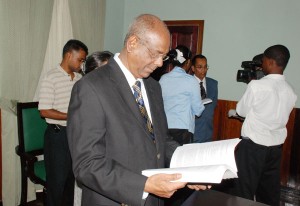Auditor General (ag) Deodat Sharma yesterday presented his report on the Public Accounts of Guyana for the fiscal year ended December 31, 2006 to the Speaker of the National Assembly, Ralph Ramkarran.
The 2006 report is nearly a year late. It should have been presented since last September.
Ramkarran yesterday noted that the presentation of the Public Accounts Report is an important facet in the thrust for public accountability and transparency.
The Audit Office of Guyana (AOG), formerly the Office of the Auditor General, was established by the Audit Act 2004, which came into operation on 27 April 2005 with the enactment of the Audit Act Commencement Order.
A statement released by the Audit Office yesterday at the handing over posited that with regard to creating stakeholder awareness of the role of the AOG, the Office is benefiting from the advice of a local public relations consultant and is in the process of developing a three-year Public Awareness Strategic Plan. The consultant is in the process of preparing a booklet and brochures which will inform stakeholders of the Audit Office’s role and responsibilities.
Two new sections have been established in the AOG under the guidance of consultants from the Canadian Comprehensive Audit Foundation: Performance Audit/Value for Money and Forensic Audit Sections. Manuals for these have been formulated. The Performance Audit section has already begun work on two performance audits and reports on these are expected to be issued in January, 2009.

It was noted that in an effort to strengthen the Audit Office, a grant was sought from the Inter-American Development Bank to support the implementation of certain aspects of the Office’s three-year strategic plan. Conse-quently, a second Technical Cooperation Agreement was signed between the Govern-ment of Guyana and the Inter-American Development Bank for US$660,000 on Septem-ber 17, 2007.
Under the first Technical Cooperation Agreement, funds were utilized to assist with the finalization of the Rules, Policies and Proce-dures Manual, a key document for the effective and efficient operation of the Office, along with assisting in modernizing the organizational and human resources management systems, improving the procedures, professional practices and technical standards, incorporating new technology and creating an accountability climate.
The Audit Office, it was revealed, continues to maintain professional ties with its counterpart Auditing Institu-tions in the Caribbean through its membership in the Carib-bean Organization of Supreme Audit Institutions (CAROSAI). Officers from the AOG participated in a number of CAROSAI activities and training activities, including an introductory course on Auditing IT Con-trols. Approximately forty staff members participated in the course on Auditing IT Controls through online and computer based training methods.
The statement acknowledged a lack of resources by the Office as continuing to hinder further progress. Nevertheless, it was noted, the office has continued to strive to produce the best output from the resources it was allotted.
In its continued drive for improvement, it was submitted, the Audit Office will aim to improve on its yearly reporting. “This can be seen with the current report being done in accordance with current and international practices…” It is also expected that the separate reports emanating from the Performance and Forensic Audit Sections will result in reports being submitted on various sectors and issues, thus reducing the need for a sizeable report at the end of the year.




